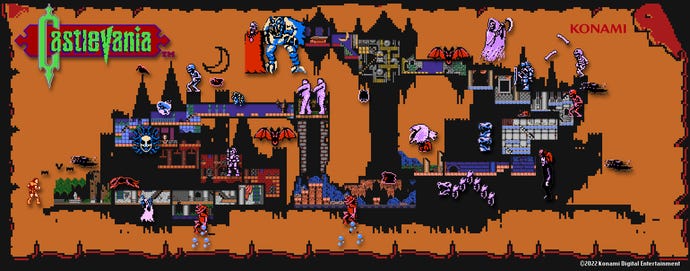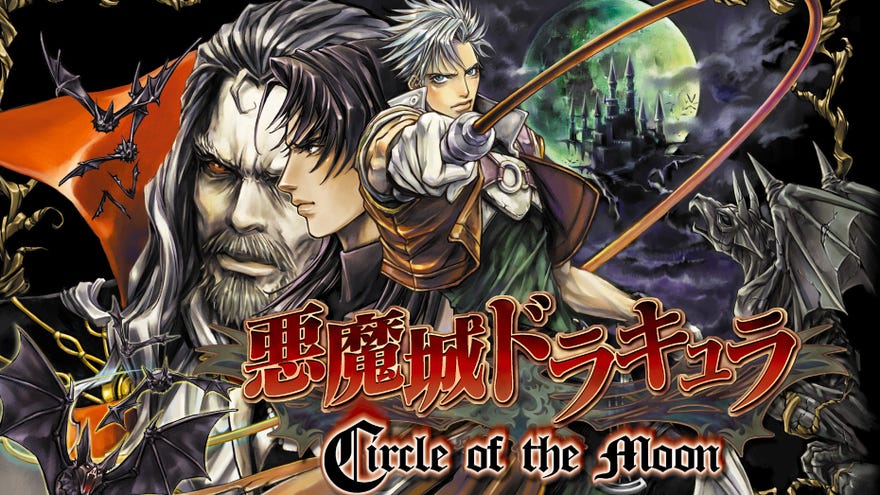Konami's Castlevania NFT collection sold for £119,000
That's a lot of money to get basically nothing
Konami's first auction of NFTs concluded over the weekend, with idiots collectively spending the equivalent of £119,000 ($162k) in cryptocurrency to buy 14 database entries pointing to Castlevania artwork, music, and videos that anyone online can see for free. On one hand, thank god it was only £119,000 because if it was the millions that some ugly Twitter avatars have sold for, every other mercenary games company would ramp up their own NFT initiatives. On the other, oh god £119,000 is still so much money for basically nothing.
The initial Konami Memorial NFT collection was for 14 Castlevania doodads auctioned on OpenSea. Altogether they sold for 49.1 Etherum, which in real money was roughly £119k ($162k). The single highest price was about £18,500 ($25.5k) for kinda a map of Dracula's castle from the first Castlevania. OpenSea take a cut for their role in sales, of course, but it's still a lot of money to make by selling nothing.
People haven't bought the videos and songs and art, only NFTs of them. They've paid for a database to say they have some sort of nebulous connection to the asset, but not any meaningful rights to them.
"The purchaser will not, by purchasing the NFT, obtain intellectual property rights (e.g. copyrights, trademark rights) in relation to the data linked to the NFT," Konami's terms explain. "Thus, the purchaser may not use the data linked to the NFT (e.g. reproductions) for commercial purposes."
It's the digital equivalent of spending £50 to 'name a star', 'buy land on the Moon', or 'become a Scottish laird'. Well, spending £18,500. So what does your money get you? The next item in the terms inadvertently lays it out.
"Konami is not able to preclude the purchaser from spreading on social media the fact that the purchaser purchased the NFT," the company continue, "nor from transferring the NFT to a third party."

So someone spent £18k for the right to brag that they spent £18k on a database entry pointing to a bad video, and maybe sell the database entry to someone else who cares about that database—or, more likely, to someone who hopes they can sell it for more money later by pretending to care about that database. Oh and as a bonus, Konami will list your name on their website for a few months.
I've been looking at the other NFTs owned by people who bought Konami's NFTs and boy howdy, many of their portfolios sure do have a load of bad art and virtual items in metaverses which no one will ever play.
Still, I'm grateful that Konami are opportunistic enough to sell old gameplay videos rather than putting serious work into NFTs. Many other companies are currently looking into designing games to sell NFTs of items and things, and the way game design would need to change to enable that could well be far more irritating for years to come.
You'd hope that EA, Ubisoft, Take-Two, and all the rest would learn from the mess Valve made of Team Fortress 2 when they rebuilt it to fuel a virtual item market. That seems unlikely, doesn't it. Especially after Peter Molyneux's next game sold £40 million in ghastly NFTs.
It seems the next step in big publishers monetising games will be "play-to-earn", the marketing term they're favouring for games built upon NFT items. On my personal ranking of AAA monetisation schemes, I'm tentatively saying worse than battle passes, better than map packs, worse than loot boxes? Hmm. I'm not sure. Normalising the latest cryptocurrency scam and trying to make video games part of #hustlelife is loathsome, but is it worse than some of the truly terrible loot boxes? Ah, what horrible questions the future brings!
I am quietly hopeful that the inherent conservatism of giant publishers will make them reluctant to truly embrace NFTs. Maybe they will simply do some trifling nonsense to please shareholders by demonstrating that yes, they are engaging with the latest buzzword. Maybe we'll largely escape the dystopian dreams of blockchain games which are hollow at heart from being built primarily to sell NFTs. Maybe we'll just see more junk like Ubisoft putting numbers on hats. Maybe the novelty will wear off soon and they'll move onto another post-launch monetisation scheme. I'd like to suggest: edible games.
Hit me up, AAA publishers; pay my £20,000 daily consultant fee and I'll explain how a nice grilled cheese sandwich is the future of the industry. I can promise you it's less daft than whatever you're paying NFT consultants for.


